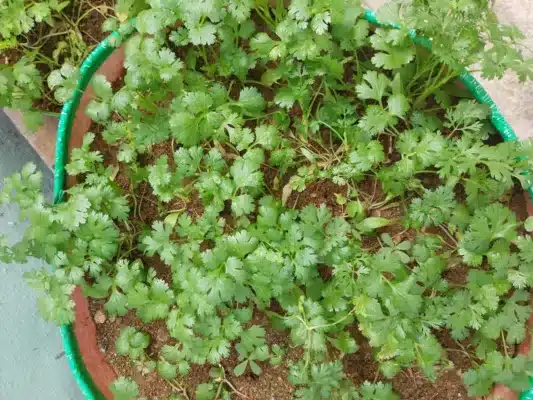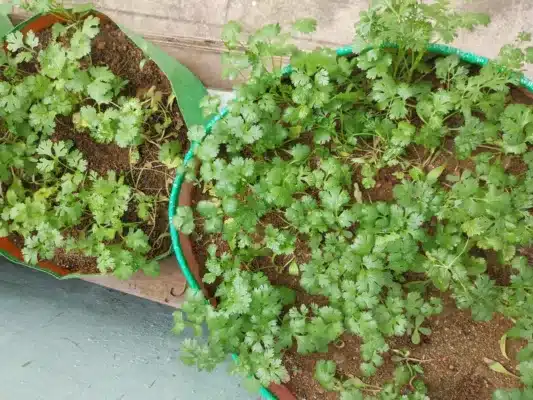Cilantro: Unveiling the Culinary Delight: Exploring the Origins, Uses, and Health Benefits (of Coriander)
Kottamalli in Tamil and Dhaniya in Hindi

Definition & Origin
Definition:
Coriander refers to both an herb and a spice derived from the dried seeds of the plant Coriandrum sativum. The plant is a member of the parsley family and is known for its fragrant leaves and seeds, both of which are used in various culinary applications.
Origin:
Coriander has a long history of use, dating back to ancient times. The plant is mentioned in ancient Sanskrit texts and was used by Egyptians, Greeks, and Romans in their cooking and for medicinal purposes. Over time, coriander spread to various parts of the world and is now a staple in many cuisines, including Asian, Middle Eastern, and Latin American.
The plant is known for its dual-use, as both the leaves (called cilantro) and the seeds are utilized in cooking. The leaves have a citrusy, herbaceous flavor, while the seeds have a warm, citrusy, and slightly sweet taste. Coriander is not only valued for its culinary properties but also for its potential health benefits.
Table of Contents
Nutrients
Cilantro: A Nutritional Powerhouse in a Tiny Package
Cilantro, also known as coriander, is a beloved herb that adds a bright, citrusy, and slightly peppery note to countless dishes. But beyond its delightful flavor, this versatile plant packs a powerful punch of nutrients that benefit your health in several ways.
A Treasure Trove of Vitamins and Minerals:
Vitamin K: A key player in blood clotting and bone health, it boasts an impressive 21% of your daily value in just one tablespoon.
Vitamin C: This antioxidant powerhouse plays a crucial role in immune function, collagen production, and iron absorption. A single tablespoon of cilantro offers 4% of your daily value.
Vitamin A: Crucial for vision, cell growth, and immune function, it provides 2% of your daily value in one tablespoon.
Folic Acid: Vital for pregnant women and fetal development, cilantro delivers 4% of your daily value in one tablespoon.
Manganese: Important for metabolism, bone health, and blood sugar control, provides 8% of your daily value in one tablespoon.
Beyond Vitamins and Minerals:
Antioxidants: Cilantro is rich in antioxidants like beta-carotene and quercetin, which protect cells from damage by free radicals and may reduce the risk of chronic diseases.
Dietary Fiber: While not a significant source, the fiber in its leaves can contribute to digestive health and satiety.
Essential Oils: The unique aromatic compounds in cilantro, like linalool and pinene, may have anti-inflammatory and antimicrobial properties.
Overall Health Benefits:
Supports Immunity: The combination of vitamin C and antioxidants in cilantro helps boost your immune system to fight off infections.
Promotes Bone Health: Vitamin K and manganese in it contribute to strong and healthy bones.
May Aid Digestion: The small amount of fiber in it can help keep your digestive system running smoothly.
Potential Anti-inflammatory Properties: The antioxidants and essential oils in cilantro may help reduce inflammation in the body.
Incorporating Cilantro into Your Diet:
Add chopped fresh cilantro to salads, salsas, guacamole, and stir-fries.
Blend it into smoothies and juices for a refreshing twist.
Use it as a garnish for soups, curries, and rice dishes.
Experiment with it as chutney or pesto for a flavorful condiment.
Cilantro’s vibrant flavor and impressive nutritional profile make it a worthy addition to your diet. So, embrace its versatility and reap the health benefits this tiny herb has to offer!
I this gives you a clear picture of cilantro’s nutrient content and its potential health benefits. Feel free to ask any further questions you may have about this flavorful and health-promoting her.

Health Benefits
Cilantro: A Tiny Herb with Mighty Health Benefits
Beyond its distinctive flavor, cilantro, also known as coriander, packs a powerful punch of health benefits due to its rich mix of vitamins, minerals, and antioxidants. Let’s explore how this humble herb can enhance your well-being:
Immune System Booster:
Vitamin C: Abundant in cin it is vitamin C is a vital antioxidant that strengthens your immune defenses, helping fight off infections and illnesses.
Antioxidants: It is brimming with antioxidants like beta-carotene and quercetin, which protect your cells from harmful free radicals and potentially reduce the risk of chronic diseases.
Bone Health Champion:
Vitamin K: Just one tablespoon of these leaves provides a significant portion of your daily K needs, contributing to strong bones and lower risk of fractures.
Manganese: Another important mineral for bone health, manganese promotes collagen production, crucial for building and maintaining strong bones and connective tissues.
Digestive Aid:
Fiber: Though not a major source, the fiber content in it helps aid digestion, promoting regularity and keeping your gut healthy.
Potential Anti-inflammatory properties: Its unique essential oils, like linalool and pinene, may possess anti-inflammatory properties, potentially easing digestive discomfort and inflammation.
Additional Potential Benefits:
May Lower Blood Sugar: Studies suggest that its leaves have antioxidants and essential oils that might help regulate blood sugar levels, potentially benefiting individuals with diabetes.
Antimicrobial Properties: Cilantro’s compounds may exhibit antimicrobial activity against certain bacteria and viruses, potentially contributing to gut health and overall well-being.
Incorporating Cilantro for More than Flavor:
Spice up your salads, salsas, and guacamole with fresh chopped cilantro.
Add a refreshing twist to smoothies and juices with a touch of its leaf.
Garnish curries, rice dishes, and soups with this flavorful herb.
Experiment with cilantro chutneys and pestos for a unique and healthy condiment.
Remember, even small amounts of cilantro can pack a powerful punch of nutrients and potential health benefits. So, embrace its versatility and enjoy the positive impact this tiny herb can have on your well-being!



Usually I do not read article on blogs however I would like to say that this writeup very compelled me to take a look at and do it Your writing style has been amazed me Thank you very nice article